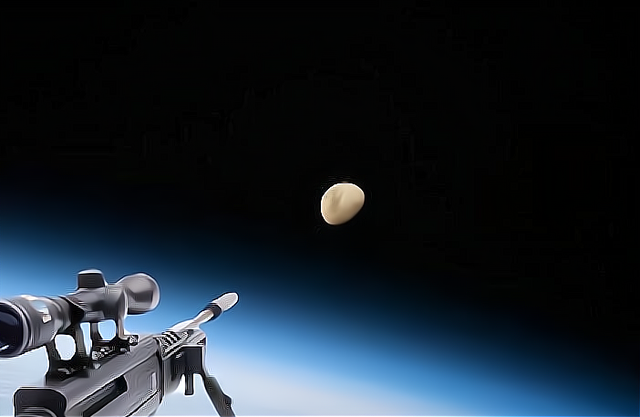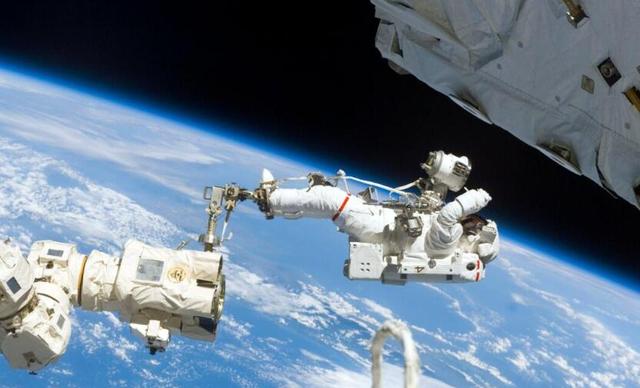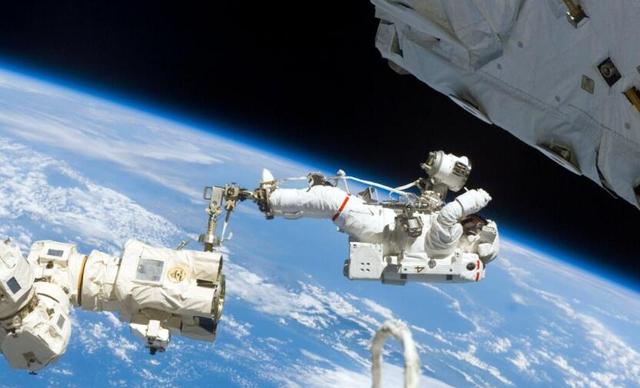What would happen if a shot was fired at the moon from a space station? Would it hit the moon? It seems safe to assume that the station is weightless and there is no air resistance in space, so if a shot is fired from the station it should travel unimpeded in a straight line, in which case it should be able to hit the moon if it is aimed well enough (e.g. With a calculated lead).

However, this does not happen, because weightlessness does not mean that the station is not subject to the earth's gravitational pull, and to illustrate this, let's look at the classic thought experiment "Newton's cannon".

As shown above, if we set up a cannon on a high mountain on earth and fire the cannonball in a horizontal direction, without considering air resistance, there will be three scenarios depending on the speed of the cannonball.
- If the cannonball is very fast, it will fly straight out of the earth. 2. If the cannonball is not fast enough, it will sooner or later fall to the ground. 3. If the cannonball reaches a suitable value, it will move in a uniform circular motion around the earth, and this speed is known as the first cosmic speed.
In fact, the space station belongs to the third case mentioned above. For this phenomenon we can simply understand that the space station is actually in free fall all the time, except that since the earth is round and the horizontal speed of the space station is very fast, the space station keeps falling down.
In free fall, all the objects inside the station (including the station itself) are falling with the same acceleration, so all the effects of gravity between the objects disappear, and in this case, the objects do not feel gravity, which is also called "Weightlessness".

As we can see, all objects in the space station are still bound by the earth's gravity, and if we want to "Shoot a bullet at the moon from the space station and have it hit the moon", the first requirement is that the bullet must be fired in the first case mentioned above, i.e., fly directly out of the earth at a very high speed. How fast does it have to be? The answer is the second cosmic speed (the minimum speed required for an object to escape the earth's gravitational bindings without power).
Note that because the station has been orbiting the earth at first cosmic speed, we should, if possible, shoot at the moon as it orbits ahead of the tangent line in the direction of the station's motion, so that the initial velocity of the bullet as it is fired and the velocity of the station are perfectly superimposed.

It is known that the first cosmic velocity is 7.9 km/s and the second cosmic velocity is 11.2/s, which means that, ideally, the bullet would only have to reach a velocity of 3.3 km/s to escape the earth's gravity and thus achieve a hit on the moon.
(note: As the space station orbits at a distance of several hundred kilometres in near-earth orbit, it is relatively less subject to the earth's gravity, so for the space station the two speeds are correspondingly lower, but the difference is not significant, so we can ignore it here)
So what kind of gun could shoot a bullet at such a speed? Unfortunately, no known gun in the world is capable of firing a bullet at such a high speed, for example the famous barrett (m82a1), whose bullets are fired with an initial velocity of only about 0.9 km/s, and even under ideal conditions its velocity would only reach at most 8.8 km/s, which is still far from the second cosmic velocity.
The launch charges of modern bullets are basically a mixture of oxidising and flammable groups, which simply means that such charges are self-oxidising, so that such bullets can still be fired properly in an environment without oxygen (in space or in water, for example).

If a shot is fired at the moon from the space station, the fired bullet will be so firmly bound by the earth's gravity that it will not be possible to hit the moon at all. Depending on the direction of the shot, the fired bullet will orbit the earth in different ways, which can be divided into roughly 3 scenarios.
If the shot is fired in the same direction as the station's orbit, then the bullet's orbit will be a narrow ellipse, if the opposite, then the bullet will slow down with respect to the earth and gradually fall into the atmosphere as it falls below first cosmic speed, eventually becoming a tiny meteor. If upwards (with respect to the earth) then the bullet's orbit will rise and will also end up as an ellipse, but not as narrow as the first case.



